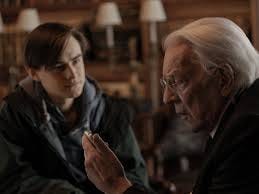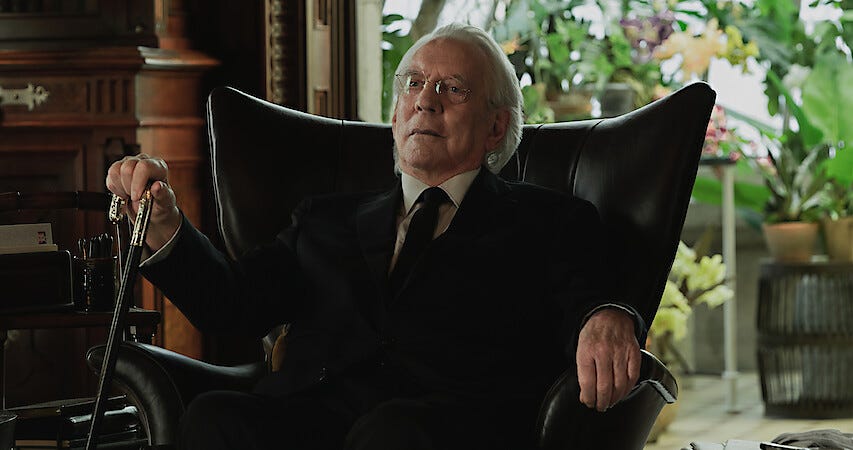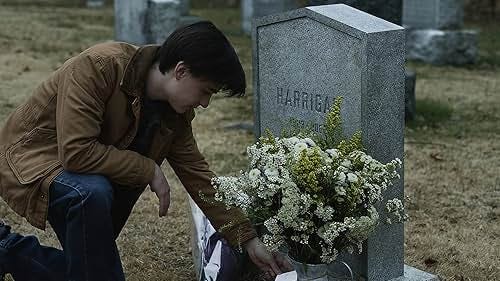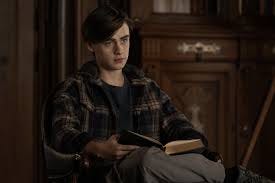Donald Sutherland Delivers a Fine Performance as a Cranky Billionaire in the Otherwise Sleepy 2023 Stephen King Adaptation Mr. Harrigan's Phone
It's not a sleeper, just sleepy.
I have a confession. While I got off to a good start in researching the project where I watch and write about all of Stephen King’s films, I hit a wall somewhere along the way. The momentum that fueled my binge-watching and binge-writing spree slowed to a crawl as I got distracted by my late father’s death and putting the finishing touches on The Fractured Mirror, my upcoming book where I write every narrative American movie about filmmaking along with a healthy cross-section of the juiciest, most entertaining, weirdest and best documentaries on the subject.
Also, I was officially diagnosed with ADHD at 48, so there is a neurological reason I continually begin ambitious new projects, only to lose interest in them early in the process when my mind becomes besotted with other ideas and I get hopelessly distracted .
It’s hard to overstate just how much time and work have gone into The Fractured Mirror. It feels like I have been working on it my entire life, if not longer.
For neurological, personal and emotional reasons, I sometimes see a movie with the intention of writing about it, only for it to float out of my memory before I’ve had an opportunity to churn out a 1000 to 1200 essay on it.
That has happened repeatedly over the course of a project that’s still pretty young. These regrettable wastes of time and energy include the original Children of the Corn, the Pet Sematary remake, Quicksilver Highway, half of the original Firestarter and Riding the Bullet.
That’s a lot! What a waste! I really should have written up each of those obscurities when I saw them but my grief-stricken brain isn’t working particularly well these days and my output is way down, though I do, ideally, find work a welcome distraction.
I’m writing about Mr. Harrigan’s Phone now because otherwise it will join that list of minor movies I saw and then failed to write about it in a timely fashion, or at all. I saw it less than three hours ago, yet it’s already fading from my mind like the picture of Marty McFly and his family in Back to the Future.
Mr. Harrigan’s Phone is adapted from the 2020 collection If It Bleeds, which also gave us The Life of Chuck, a movie that is burned indelibly into my mind because it’s a powerful movie about life’s fragility and the power of dance that I was watching when my dad died.
I had an intense response to The Life of Chuck. I had a negligible response to Mr. Harrigan’s Phone. It’s a half-hearted shrug of a movie that finds King moving away from conventional horror while retaining a supernatural element involving ghosts and the dead using contemporary technology.
Donald Sutherland is the only reason anyone should even consider seeing this forgettable trifle.
Dark men of authority were Sutherland’s specialty as a character actor. He spent three solid decades playing old men with gravitas who are the conflicted holders of dark information.
He played that role to perfection in 1991’s JFK. He plays a similar role here. Sutherland dominates the film the same way he dominates the small, ordinary life of Craig, a child of motherless child of modest means who picks up a curious afterschool gig reading classical literature to the oldster.
Sutherland was deep into his eighties when he played the challenging lead role of an ornery billionaire who, like most billionaires, did not become unspeakably, immorally wealthy by being generous and kind. He made an unethical fortune by being a bastard who doesn’t let anything get in the way of amassing as much money as possible.
Harrigan is a bit of a Scrooge figure. A lifetime of being ruthless in his personal and professional lives has left me him lonely and friendless. He’s also a cheap bastard who gives his employees scratch-off tickets for bonuses when he could easily afford to provide for their children and their children’s children.
I’m not sure Sutherland stands up at any point in Mr. Harrigan’s Phone. He’s a sick old man playing a sick old man near the end of his life. Yet Sutherland makes him a force all the same. Mr. Harrigan’s Phone captures the pulse-pounding excitement of an old man sitting in a chair.
Sutherland doesn’t need to stand to command the screen. He completely overshadows younger costars who can no doubt perambulate freely yet lack a fraction of Sutherland’s movie star magnetism.
Our earnest hero’s excessive narration tells us that Mr. Harrigan is not a good man. Yet he shows a side of himself to Craig that he keeps hidden from everyone else. He’s not exactly warm and fuzzy but he treats Craig with respect. He’s willing to be vulnerable and human with a child he likes as much as he is capable of liking anyone.
Mr. Harrigan’s Phone is about as pleasant as Stephen King gets. I was reminded throughout of Driving Mrs. Daisy throughout. This might as well be called Reading to Mr. Harrigan, but I don’t know if audiences were ready for such an exciting title.
Mr. Harrigan is a Luddite who takes pride in not owning any electronic gizmos that might force him to interact with other human beings not in his employ. But when a scratch-off lottery ticket Mr. Harrigan buys him lands a three thousand dollar payday Craig uses part of his windfall to buy his employer an iPhone.
There’s a terrific scene where the eponymous crank has his first exposure to an internet-fueled phone and rages correctly that it is far too powerful, and can only be a malevolent presence, individually and in terms of society.
He’s a cranky oracle but he’s also on his damn phone when Craig comes to read to him. He cannot resist the irresistible. Alas, everyone dies, except Donald Trump, apparently, who will live forever.
Mr. Harrigan dies. He leaves Craig enough money for college but he leaves him something else as well: the strange gift of ambiguous posthumous revenge.
Like many characters in bland coming-of-age stories, Craig has a crush and a bully. The bully who terrorizes our bland hero is regrettably named Kenny Yankovich. How the hell are you going to give a minor character a name like that and not have audiences thinking about accordion-fueled pop parodies from a Hawaiian shirt-clad musical genius?
King is a big music guy. He loves rock and roll, so giving the one-dimensional bully a last name strongly associated with one of the most beloved figure in pop culture is either an homage that backfires spectacularly because it makes us think about “Weird Al” or an oblivious mistake.
It’s not unlike how the female lead in one of the early Ernest movies is named Barbara Bush. That’s not just like the name of the then-current first lady: that was exactly the name.
Needless to say, the actor playing the suspiciously ancient-looking bully wasn’t memorable enough to make me, or anyone, forget the pop parodist behind such hits as “Eat It” and “Smells Like Nirvana” and coffee table marvels like Weird Al: the Book.
Craig calls Mr. Harrigan’s phone and expresses a strong desire for something bad to happen his bully, who soon meets a violent, suspicious end. Next, a drunk driver kills Craig’s favorite teacher and gets a slap on the wrist.
This leads Craig to take to his iPhone to once again ask Mr. Harrigan’s ghost to do his dirty work. The accidental killer ends up dead in a shower and Craig realizes that he should probably stop using a phone with supernatural powers to wish death upon his enemies.
Mr. Harrigan’s posthumous spree isn’t played for horror or laughs. In that respect it’s like 2004’s Riding the Bullet, which likewise had supernatural elements but was fundamentally a lumpy, meandering coming-of-age story clumsily duct-taped together with wall-to-wall narration.
As phone-based King adaptations go, Mr. Harrigan’s Phone is a big step up from The Cell but fails to justify its existence. It’s not good. It’s not bad. It just is.
Many films have been made from King’s work. This is certainly one of them.














“ Mr. Harrigan’s Phone captures the pulse-pounding excitement of an old man sitting in a chair.” —Ha ha ha!
You mentioned you forgot it, but would still like your thoughts on Children of the Corn. Growing up, I had the poster of CoC II: Urban Harvest hanging in my room—not because I liked the film (or the poster), but because I got it for free at the theater. What a franchise!
"A lifetime of being ruthless in his personal and professional lives has left me him lonely and friendless."
That's a harsh typo.